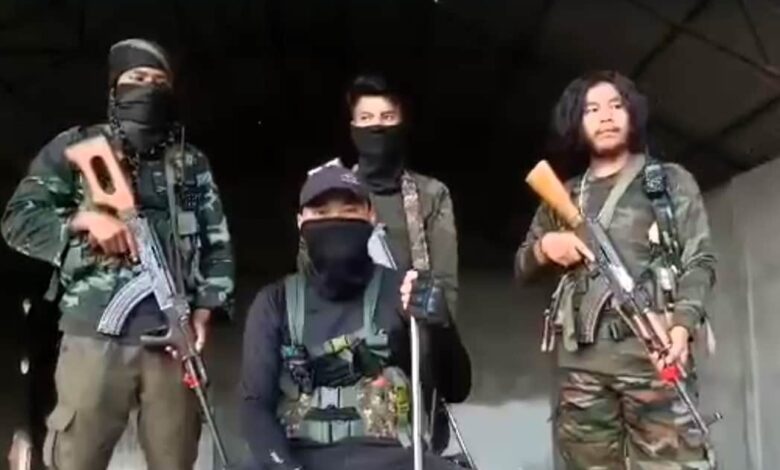
The Manipur government has asked the police to hand over the case of attack on the ancestral house of a key Thadou tribe leader and BJP spokesperson to the National Investigation Agency (NIA).
The state government in a letter to the police chief said the case filed over the attack on the house of T Michael Lamjathang Haokip in Churachandpur district, where his elderly parents and some internally displaced people live, should be forwarded to the NIA as soon as possible.
“In view of the serious nature of the matter, DGP (Director General of Police), Manipur is kindly requested to submit the proposal for forwarding this case to the NIA at the earliest,” the state government said.
NDTV has seen a copy of the letter.
Mr Haokip’s house was vandalised and set on fire in Kuki-dominated Churachandpur on August 31 in the third attack at his house since the Meitei-Kuki ethnic violence began in May 2023. The attack happened on a day the Kuki tribes held protests against Manipur Chief Minister N Biren Singh, who they said was responsible for the crisis, citing a leaked audio tape which the state government had called “doctored”.
Six days earlier, on August 25, over two dozen people, some of them armed, had vandalised Mr Haokip’s house and also fired shots in the air.
In a first information report (FIR), Mr Haokip had named 15 people as “directly or indirectly” responsible for the attack on his property and family. He also named two people who allegedly asked members of a WhatsApp group to kill him. One of the two promised to give “village land” to anyone who kills the state BJP spokesperson.
Thadou tribe leader and Manipur BJP spokesperson T Michael Lamjathang Haokip
Mr Haokip has said the attacks and threats came as a result of him raising awareness about his tribe, Thadou, being inaccurately referred to as a Kuki tribe amid the ethnic tension in Manipur.
READ | “Kill Him, Will Give My Land…”: Manipur BJP Spokesperson’s FIR Over Death Threats, Attack On House
Mr Haokip, the Thadou Community International (TCI) and the Thadou Students’ Association (TSA-GHQ), of which he is a key leader, have sought to draw attention to the tribe’s “inaccurate” reference by leaders and the media, and to spread awareness that “the Thadou tribe is distinct and any confusion with other tribes surmount to being racist, abusive, disrespectful, traumatising and it puts the Thadou tribe in poor light”.
“… There’s hope the perpetrators’ intentions and masterminds will be exposed, and justice will be served to all the victims of the horrible crime and injustice, including Michael Lamjathang, his family and Peniel villagers,” the TSA said in a statement on Friday, welcoming the decision of the Manipur government to hand over the investigation to the NIA.
Letter To Kuki National Organisation (KSO)
The TSA on September 15 wrote to the heads of the Kuki National Organisation (KNO), seeking their cooperation in identifying suspects who attacked Mr Haokip’s house twice last month. TSA spokesperson Vicky Thadou in the letter said that Peniel village, where Mr Haokip’s senior citizen parents live in their ancestral house, falls within the operational area of KNO, and are dominated by KNA, KNFMC, KNF-S, KNF-Z, and KLA – the five constituents of the KNO.
“… We hold the KNO and the local civil organisations morally responsible for the attacks,” the TSA said in the letter addressed to the KNO president and vice presidents.
The Kuki National Front (Samuel), or KNF(S), in a statement refuted the TSA’s allegation and requested people to “stay away from this misinformation and blatant accusation.” “… The blatant accusation that the incident took place within the operational area of the organisation is nothing, but the act of tarnishing the image and reputation of KNF(S),” the KNF(S) said in a statement, referring to the Suspension of Operations (SoO) agreement.
The TSA in the statement on Friday acknowledged the KNF(S)’s response and pointed out that only one of five armed groups under the KNO has responded.
“… The fact that other groups have neither condemned the repeated terror attacks nor clarified on the matter only strengthen the suspicion of their involvement in the attacks, which would clearly amount to gross violation of the ground rules of the Suspension of Operations agreement between the groups and the government,” the TSA said.
The KNO is one of the two umbrella organisations of 23 Kuki-Zomi-Hmar insurgent groups that have signed the controversial tripatriate SoO agreement with the state government and the Centre. The other is the United People’s Front (UPF). The KNO and the UPF represent these 23 Kuki-Zomi-Hmar insurgent groups.
Broadly, the SoO agreement says the insurgents are to stay at designated camps and their weapons kept in locked storage, to be monitored regularly. Every year, a joint monitoring group reviews the SoO agreement and decides whether to end or renew it. The agreement lapsed on February 29 this year – the same day the Manipur assembly unanimously passed a resolution asking the Centre to scrap the agreement. The 10 Kuki-Zo MLAs did not attend the assembly session.
The Manipur government has alleged some Kuki insurgents who are part of the SoO agreement have been participating in the ethnic conflict, thus violating the ground rules.
READ | End Ceasefire With All Kuki-Zo Insurgent Groups: Manipur Assembly Unanimous Resolution
Leaders of the Kuki tribes have also accused the state government headed by Chief Minister N Biren Singh, who is from the valley-dominant Meitei community, of looking the other way when insurgents of the Meitei group United National Liberation Front (Pambei), or UNLF(P), allegedly participated in the violence. The UNLF(P) last year signed a peace deal with the Centre and the state government, after which its personnel came overground.
There are many villages of the Kuki tribes in the hills surrounding the Meitei-dominated valley. The clashes between the Meitei community and the nearly two dozen tribes known as Kukis – a term given by the British in colonial times – who are dominant in some hill areas of Manipur, has killed over 220 people and internally displaced nearly 50,000.
The general category Meiteis want to be included under the Scheduled Tribes category, while the Kukis who share ethnic ties with people in neighbouring Myanmar’s Chin State and Mizoram want a separate administration carved out of Manipur, citing discrimination and unequal share of resources and power with the Meiteis.




